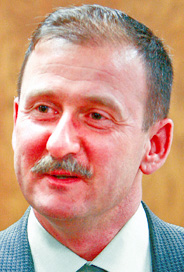Health-district partnership with NEOUCOM benefits community
Health-district partnership with NEOUCOM benefits community
By WILLIAM K. ALCORN
alcorn@vindy.com
AUSTINTOWN

Matthew Stefanek
A new partnership between the Mahoning County Health District and Northeastern Ohio Universities Colleges of Medicine and Pharmacy will benefit the university and the local health department and community, officials said.
“An important part of our mission is to train health professionals in disease prevention and health promotion,” said Matthew Stefanak, health commissioner at the county board of health.
“This agreement strengthens a long- standing relationship between our health department and NEOUCOM that benefits us both,” said Stefanak, who is a volunteer instructor of behavioral and community health services at NEOUCOM.
NEOUCOM, in Roots- town, is a community- based, public institution with long-established relationships with hospitals.
More recently, it has begun establishing formal ties with health departments that will benefit medical students by exposing them to environmental and public health issues, such as mosquito control or pollutions, which they rarely get a chance to explore in medical school, said Dr. Jay Williamson, interim dean of the College of Medicine.
The partnerships also provide access to university resources that the local health departments might not otherwise have, Dr. Williamson said.
The Mahoning County District Board of Health is the fourth area health district with which NEOUCOM has formalized relationships.
The others are Akron city and Stark and Portage counties. NEOUCOM was the first public medical college in the nation to formally affiliate with public-health departments, officials said.
“Part of our mission is to train health-care professionals about disease prevention. We put the medical students in real-life situations,” Stefanak said.
For instance, NEOUCOM students have measured and weighed school children to determine how pervasive obesity is and to give feedback to school administrators and parents.
Another group looked at tuberculosis-prevention programs to determine how effective they were, he said.
Also, it benefits the community because some of these medical students will enter residency programs in local hospitals and will be better trained in public-health issues, Stefanak said.
 43
43
